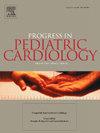Are you asleep? Comparing sleep metrics in pediatric cardiac patients with objective and subjective indicators
IF 0.6
Q4 PEDIATRICS
引用次数: 0
Abstract
Background
Examination of sleep in pediatric cardiology patients has typically relied on self-reports with unknown reliability to objective assessments. Wearable technologies provide an objective data source for evaluating sleep. Improved understanding and treatment of sleep in pediatric heart patients may be an untapped aspect that could improve health-related quality of life.
Objectives
The purpose of this study was to identify patterns of duration and quality of sleep in pediatric cardiology patients using both subjective and objective assessment.
Methods
Patients were recruited in a pediatric cardiology clinic and completed a set of sleep and quality of life questionnaires, including the Pittsburg Sleep Quality Index (PSQI), the Pediatric Cardiac Quality of Life Inventory (PCQLI), and the Cardiac Anxiety Questionnaire (CAQ). Patients also agreed to wear an actigraphy watch for 7 days, and caregivers were also recruited as proxy raters.
Results
The sample included 31 patients with a mean age of 15.58 (SD = 1.89). Patients self-reported an average sleep duration of 7.61 h (SD = 1.67, range = 3–11). In contrast, objective sleep data indicated that patients obtained an average of 5.98 h of sleep nightly (SD = 1.01, range = 3.23–7.46) with a sleep efficiency score of 73.2 (SD = 6.23) and a sleep latency period of 21.04 min (SD = 19.16, range = 1–63). Parent-reported sleep duration on the PSQI had a mean of 8.10 h (SD = 1.34, range = 6–11). Thirty four percent of patients met PSQI cut off score for poor sleep based on self-report and 30 % based on parental-report.
Conclusions
Pediatric cardiac patients report better sleep duration than objective assessments. These data suggest that sleep complaints from pediatric cardiac patients may benefit from objective assessment and may need enhanced clinical attention since complaints may overestimate the duration of sleep.
求助全文
约1分钟内获得全文
求助全文
来源期刊

PROGRESS IN PEDIATRIC CARDIOLOGY
PEDIATRICS-
CiteScore
0.90
自引率
11.10%
发文量
69
审稿时长
75 days
期刊介绍:
Progress in Pediatric Cardiology is an international journal of review presenting information and experienced opinion of importance in the understanding and management of cardiovascular diseases in children. Each issue is prepared by one or more Guest Editors and reviews a single subject, allowing for comprehensive presentations of complex, multifaceted or rapidly changing topics of clinical and investigative interest.
 求助内容:
求助内容: 应助结果提醒方式:
应助结果提醒方式:


